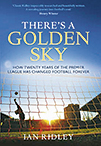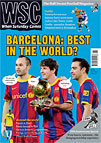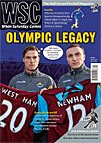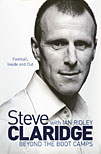 There’s A Golden Sky: How 20 years of the Premier League has changed football forever
There’s A Golden Sky: How 20 years of the Premier League has changed football forever
by Ian Ridley
A&C Black, £18.99
Reviewed by Ed Wilson
From WSC 305 July 2012
In the same way that the X Factor is only capable of assessing the importance of the Beatles through the number of “units” they sold, the Premier League is often characterised as measuring success by spreadsheets alone. There’s A Golden Sky is Ian Ridley’s contribution to the debate about the impact of the League – and its money – on the English game as a whole.
Ridley, who writes for the Daily Express, takes the 2010-11 season – the 19th year of the competition, but the 20th anniversary of its conception – as the backdrop to his journey through English football, encompassing everything from the perennial contenders for the Champions League positions to Sunday league players struggling to keep down the previous night’s drinks.
The author has twice served as chairman of Weymouth FC, so perhaps it is not surprising that this book excels when it deviates from the mainstream. There are touching profiles of Wembley FC and Truro City, a visit to Hackney Marshes and an intriguing encounter with Spencer Trethewy who, at 19, announced his ill-fated plan to “save” Aldershot FC on Wogan.
As well as highlighting the knife-edge existence of smaller clubs, these chapters constitute an attempt to answer the question of what drives people to get involved at non-League and grassroots level – from personal grandstanding to a genuine desire to serve the community. At this level, money is not much of a motivator.
Oddly, given the book’s title, the chapters on the Premier League are the least engaging. Occasionally they throw up a new angle or a quirky fact. Sir Alex Ferguson, for example, personally checks each of his players for jewellery before they leave the changing room on matchdays. Don’t think about it too much – the mental pictures aren’t especially pretty. But too often the subjects have been covered so exhaustively that Ridley struggles to find a fresh perspective. If there is anything interesting left to say about Roman Abramovich’s takeover of Chelsea it is unlikely that the club’s chairman, Bruce Buck, is going to be the person to say it.
The book is relatively generous in its treatment of the Premier League. The structure prevents sustained polemic – each chapter could work as a standalone essay – and there are regular reminders that the interests of the game have not always been well served by other custodians, such as the government and the FA. This is not a demolition job of everybody involved with the top division; the account of the destructive impact of gambling addictions on players is sensitively handled and surprisingly affecting.
Ridley is rarely overtly scathing about the Premier League and there are more robust critics of its influence on the English game. Nonetheless, There’s A Golden Sky is a witty and engaging survey of the way the footballing landscape has changed in the last two decades. The snapshots Ridley has chosen to include – from the Glazers’ leveraging of Manchester United to local chairmen keeping clubs afloat with their own money – speak for themselves.



 by Steve Claridge with Ian Ridley
by Steve Claridge with Ian Ridley